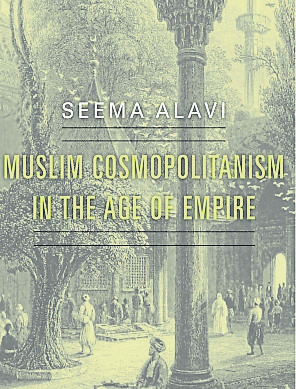
Muslim Cosmopolitanism in the Age of Empire. By Seema Alavi. London: Harvard University Press. Pp490. 2015. HB
The author of this book is a noted historian who specialises in the modern South Asian history and is currently Professor of History at the University of New Delhi, India. She has published many essays and articles on aspects of modern South Asian history and politics, although the book under review is one of her latest contributions.
According to the author: ‘This book is an attempt to understand the cultural world of Indian Muslims in the Age of Empire. I have tried to place Indian Muslims in the interconnected and vast Asian continent that was both carved up and sewn together by the Western Empire. Moving beyond binaries such as nationalism and imperialism, the Muslim umma and the European empire, Islam and Christianity, or simply the East and the West, I want to show how the cultural universe of Muslims was actually shaped. British, Ottoman and imperial networks encouraged the creation of pan-Islamic global public sphere. I call this the new Muslim metropolis.’ (p.x)
Consisting of an introduction, six chapters and a conclusion, in this book the author explores the lives and careers of five Indian Muslim scholars who, following the uprising of 1857 (otherwise known as the Indian Mutiny), found themselves at odds with the British authorities. Unable to reconcile themselves with their new rulers, they were forced to flee India and settle in other parts of the Muslim world including Arabia, Ottoman Turkey and Egypt. As a result, they came in contact with other Muslim scholars and political activists, which in turn led to the emergence of a powerful Pan-Islamic movement during the age of the empire when the British and Ottoman empires were all too often at loggerheads with one another.
Focusing the lives and works of Sayyid Fadl (chapter two), Mawlana Rahmatullah Kairanwi (chapter three), Shaykh Imdadullah Makki (chapter four), Siddiq Hasan Khan of Bhopal (chapter five) and Mawlana Jafer Thanesri (chapter six), the author argues that these scholars and activists played a critical role in the emergence of a global Muslim sensibility – thus combining political and cultural affiliation with ideas of nationhood.
In other words, according to the author, ‘These men are the cosmopolitan actors of the book – men who moved across the imperial assemblages and used the imperial knowledge, strategies, and rivalries of the nineteenth century to their advantage. They carved out a spiritual and civilizational space between the British and the Ottoman Empires and projected it as their cosmopolis. Here, they articulated a cosmopolitanism that was in sync with the reformist and scientific spirit of the times. This was a cosmopolitanism that forged widespread Muslim connectivity…Indeed, imperial networks offered the base on which earlier forms of Muslim connectivity and its repertoire of knowledge and communication skills were easily grafted: diplomacy, kinship ties, and the writings of commentaries on Islamic theological works and its sacred texts.’ (pp13-14)
Being a noted historian, the author does provide a largely accurate historically account of the lives and careers of the five prominent Indian Muslims. However, the same cannot be said about her knowledge and understanding of their theological and literary contributions. She is equally careless when it comes to transliteration of Arabic and Persian words, not to mention titles of classical and modern Islamic literature, and even names of places. For example, the ‘Qur’an’ is wrongly spelt as ‘Koran’ throughout the book and ‘Wahhabi’ is consistently written as ‘Wahabi’. Likewise, Shah Muhammad Ismail (better known as Shah Ismail Shahid) is wrongly referred to as Sayyid Ishmael Shahid (p35). Furthermore, the author defined ‘Ijtihad’ as ‘human judgement’ (p271) when, in fact, it is ‘independent scholarly discretion’, etc.
Having said that, this is a useful and interesting book, and the author deserves credit for her efforts. Students and scholars of modern South Asian history and politics will, no doubt, find it of benefit. And whilst the book contains extensive notes, for reasons unknown, there is no bibliography.
Muhammad Khan, M Khan is author of Great Muslims of the West: Makers of Western Islam (Kube Publishing, Sept 2017)